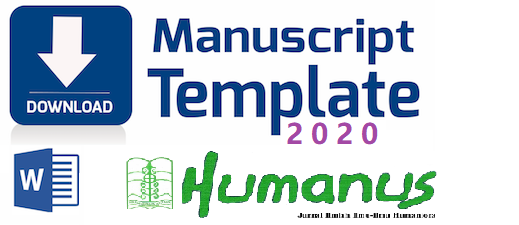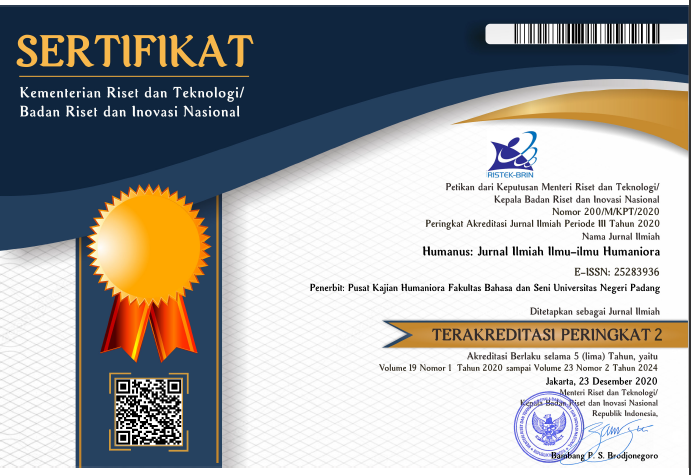Collaborative Governance and Strengthening Household Resilience in Faching Disaster at Ciliwung Riverbank, Jakarta City
 ), Zusmelia Zusmelia(2), Felia Siska(3), Elvawati Elvawati(4), Yenni Melia(5),
), Zusmelia Zusmelia(2), Felia Siska(3), Elvawati Elvawati(4), Yenni Melia(5), (1) PGRI University West Sumatra
(2) PGRI University West Sumatra
(3) PGRI University West Sumatra
(4) PGRI University West Sumatra
(5) PGRI University West Sumatra
 Corresponding Author
Corresponding Author
Copyright (c) 2022 Humanus
DOI : https://doi.org/10.24036/humanus.v21i2.115709
Full Text:
 Language : en
Language : en
Abstract
The focus of this study is to analyze collaborative governance and strengthening household resilience to disasters. The theory used is the collaborative governance theory from Emerson et.al and the household resilience theory from Karbon et.al. This research uses a mix method research approach. Data collection techniques started from participant observation techniques, in-depth interviews, unstructured discussions, survey techniques and group interview methods. The unit of analysis in this study were individuals and households at the RW and RT levels. This study used data analysis of the Miles and Huberman model in qualitative analysis and Importance Performance Analysis (IPA) analysis in quantitative approach. The results of this study showed that households at the Ciliwung Riverbank remain resilient in disaster areas due to their success in building cooperation and creating new behaviors. Cooperation was carried out not only at the household level but also at the national level. This success showed that households were able to take action together, carry out risk reduction activities and are able to increase the capacity of economic life in the household. The novelty in this study is that collaborative governance creates new behaviors to reduce the impact of disasters and strengthen household resilience to stay in the disaster area.
Keywords
References
Aisyah, Putri, and Ratih Arruum Listiyandini. 2015. “Peran Resiliensi Dalam Memprediksi Kualitas Hidup.” PESAT (Psikologi, Ekonomi, Sastra, Arsitektur & Teknik Sipil) 6(2014):58–65.
Alexander David. 2015. “Disaster and Emergency Planning for Preparedness, Response, and Recovery.” Natural Hazard Science: Oxford Research Encyclopedias. 9:1-20.doi: 10.1093/acrefore/9780199389407.013.12.
Ariyoso. 2009. “Konsep Importance Performance Analysis (IPA).” Artikel. Tersedia Pada http://ariyoso.wordpress.com/2009/12/15/konsep-Importance Performanceanalysis/. Diakses Tanggal 10 Januari 2020.
Arrozaaq, Dimas Luqito Chusuma. 2016. “Collaborative Governance (Studi Tentang Kolaborasi Antar Stakeholders Dalam Pengembangan Kawasan Minapolitan Di Kabupaten Sidoarjo).” Kebijakan Dan Manajemen Publik 3:1–13.
Badan Nasional Penanggulangan Bencana. 2018. Jumlah Kejadian Bencana Sampai 26-05-2018. Jakarta.
BNPB. 2019. “Rencana Nasional Penanggulangan Bencana 2020-2024.” Rencana Nasional Penanggulangan Bencana 2020-2024 1–115.
Bourdieu Pierre. 1985. Teh Forms of Capital, In Handbook of Theory and Research for the Sociology of Education, Ed John Richardson. New York: Greenwood.
Coleman JS. 1998. “Social Capital in the Creation of Human Capital. American.” Journal of Sociology 94(95–120).
Creswell, John W. 2010. Research Designi: Pendekatan Kualitatif, Kuantitatif Dan Mixed. Yogyakarta: Pustaka Belajar.
Emerson Kirik, Tina Nabatchi, Stephen Balogh.22(1):1-29. 2012. “Integrative Framework for Collaborative Governance.” Journal of Administration Research and Theory. 22(1):1–29.
Fitrianti, Nur Aini, and Nurul Laili Fadhilah. 2018. “Relokasi Permukiman Warga Bantaran Sungai Ciliwung Di Provinsi Jakarta.” Lentera Hukum 5(2):277. doi: 10.19184/ejlh.v5i2.6788.
Inayah. 2012. “Peranan Modal Sosial Dalam Pembangunan.” Jurnal Pembangunan. 12(1):43–49.
Irwan. 2021. “Penguatan Modal Sosial Melalui Media Sosial Untuk Peningkatan Rumah Tangga Menghadapi Bencana Di Bantaran Sungai.” Insitut Pertanian Bogor.
Irwan, Lala M. Kolopaking, Pudji Muljono, Yonvitner, and Sriwulan Ferindian Falatehan. 2020. Social Media Strengthens Social Capital in Dealing with Disaster on the Riverbanks. Vol. 14.
Irwan, Lala Kolapaking M, Pudji Muljono, and Yonvitner. 2019. “Strengthening the Solidarity Through Social Media Networks in Communities at The Ciliwung Riverbank.” Komunitas: International Journal of Indonesian Society and Culture 11(2):188–94. doi: 10.15294/komunitas.v11i2.20606.
Karimatunnisa Aisyah, Nurmala K.Pandjaitan. 2018. “Peran Modal Sosial Dalam Resiliensi Komunitas Menghadapi Erupsi Gunung Merapi Kalitengah Lor, Desa Glagaharjo, Kecamatan Cangkringan, Kabupaten Sleman, D.I. Yogyakarta.” Jurnal Sains Komunikasi Dan Pengembangan Masyarakat [SKPM] 2(3):332–346.
Miles, Matthew B. &. A.Michael Huberman. 1992. Analisis Data Kualitatif. Depok: Universitas Indonesia Press.
Pramono, Rudy. 2016. “SOCIOLOGICAL PERSPECTIVES IN DISASTER MANAGEMENT.” 18(1):81–96.
VanBreda A.D. 2001. Resilience Theory: A Literature Review. South African Military Health Service. South Africa: MilitaryPsychological Institute.
Yulianto, Anton, and Diah Mutiarin. 2018. “Pelaksanaan Collaborative Governance Dalam Desa Tangguh Bencana.” Prosiding Konferensi Nasional Ke-8 APPTMA 1(1):1–13.
 Article Metrics
Article Metrics
 Abstract Views : 603 times
Abstract Views : 603 times
 PDF Downloaded : 178 times
PDF Downloaded : 178 times
Refbacks
- There are currently no refbacks.
Copyright (c) 2022 Humanus

This work is licensed under a Creative Commons Attribution-NonCommercial 4.0 International License.










